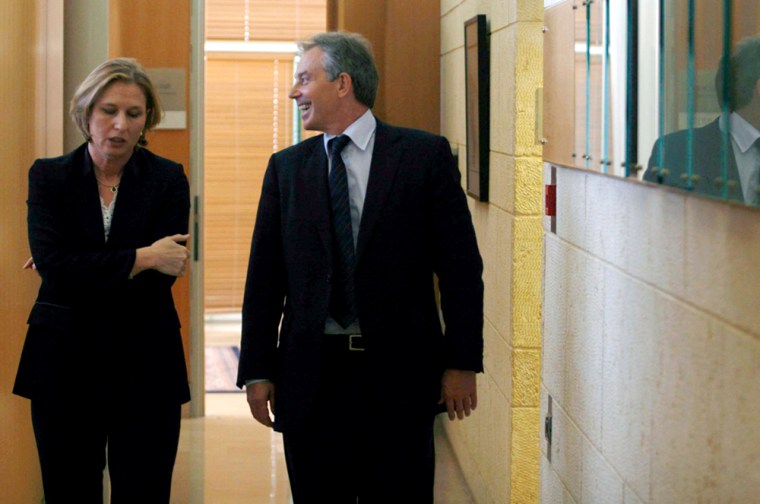Former British Prime Minister Tony Blair opened his mission Monday to help Palestinians build solid foundations for their future state, offering ideas to Israeli leaders designed to stabilize the shaky government of Palestinian President Mahmoud Abbas.
Israeli Foreign Minister Tsipi Livni said the Blair mission on behalf of the "Quartet" of Mideast mediators comes at a "critical time when it is possible to create a change of direction" after years of stalemate in peacemaking.
Blair's limited mandate from the four powers — the United States, European Union, United Nations and Russia — was to help the Palestinians develop their economy, build governing institutions and to lay the groundwork for statehood.
But he was instructed to leave aside the underlying issues of the 60-year-old Mideast conflict, such as borders, Palestinian refugees and the governance of Jerusalem, raising questions about how effective he can be.
Israel says the importance of Blair's task should not be underrated. "Anyone who believes that nation-building is a peripheral issue doesn't understand the process," said Livni's spokesman, Mark Regev, after Blair's first meeting with her.
Regev said Blair and Livni exchanged ideas, and that Blair's first trip was more than a listen-and-learn mission.
"He's listening, but he's not coming as a newcomer," Regev said. Blair "has extensive knowledge of the area. He is well aware of the concerns of both parties. He is well positioned to help the process."
'Preliminary visit'
Blair's office took a more low-key tone, calling it "a preliminary visit to hear the views of key Israelis and Palestinians about the issues that have to be addressed in order to fulfill the demanding mandate Mr. Blair has taken on." He also would consult with Arab leaders, a spokesman said.
Creating the conditions of good governance has been complicated by the feud among the Palestinians that led to the forcible takeover of Gaza by the Islamist Hamas movement in a bloody five-day war. Abbas' Fatah movement now spearheads a moderate government in the West Bank while Hamas has control of Gaza.
In a statement after their meeting, Livni cautioned Blair to adhere to the internationally accepted policy of shunning Hamas, and to beware of "giving it legitimacy, either directly or indirectly."
Hamas, which won Palestinian legislative elections last year, warned that it cannot be ignored. "It will lead to nothing but failure," said Hamas spokesman Fawzi Barhoum.
Blair travels to the West Bank on Tuesday to meet Abbas and his prime minister, Salam Fayyad, before winding up his maiden foray with a dinner at the home of Israeli Prime Minister Ehud Olmert.
Israel has taken a series of measures designed to boost Abbas' standing among his own people. It released tax revenues it had collected and withheld, freed more than 250 prisoners from jail, granted amnesty to Fatah-affiliated gunmen on its wanted list, and established regular meetings between Abbas and Olmert.
Jewish squatters removed
On Monday, army and police forces forcibly removed a large group of Jewish squatters who had entered the abandoned West Bank Jewish settlement of Homesh. It was one of four West Bank settlements evacuated in 2005 when Israel also dismantled all 21 settlements in Gaza and formally ended its occupation of the coastal strip.
The complexity of Abbas' ties with Gaza after Fatah's defeat last month was underscored by his decision Sunday to pay back salaries to civil servants in Gaza and to Hamas legislators, including the deposed prime minister, Ismail Haniyeh.
Earlier this month, the government paid full salaries for the first time in 15 months after the international community lifted the aid boycott imposed when Hamas won last year's election. Abbas paid more than 130,000 government workers, but refused to pay some 30,000 people hired by Hamas, including its security force.
Information Minister Riad al-Malki said the legislators will get their back pay because they were elected officials, but the Hamas-employed civil servants still won't be paid.
The payments were an apparent attempt by Abbas' government to assert its claim to rule over all Palestinians, including those in Gaza.
Jordan stop earlier
Blair's unmarked private jet arrived at Israel's international airport near Tel Aviv from Amman, Jordan, where he met with Foreign Minister Abdul-Ilah al-Khatib. Jordanian officials said Blair listened to Jordan's perspective on restarting the Mideast peace process. Jordan and Egypt are the only Arab countries that have made peace with Israel.
The visit is part of a flurry of diplomatic activity aimed at bringing Israel and the Palestinians back to the negotiating table.
U.S. President Bush called last week for an international peace conference on the Middle East in the autumn. On Wednesday, the Jordanian foreign minister and his Egyptian counterpart, Ahmed Aboul Gheit, are due in Israel to formally present an Arab peace initiative that envisions full Arab recognition of Israel in return for lands the Jewish state captured in the 1967 Middle East war.
